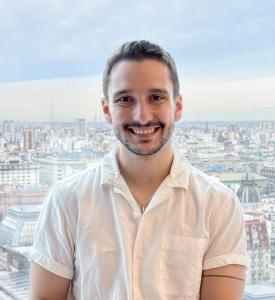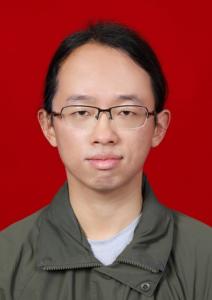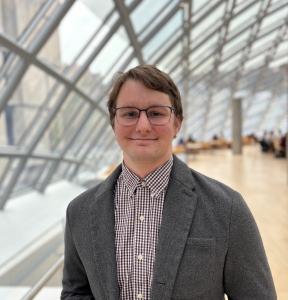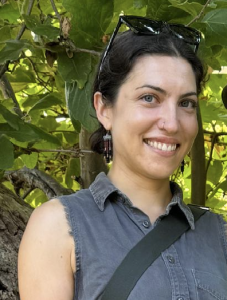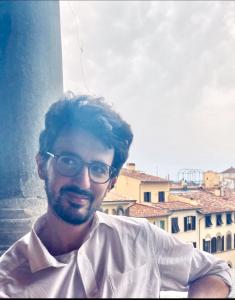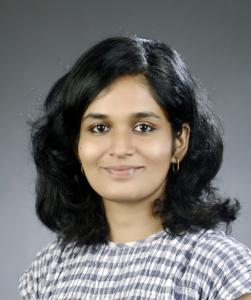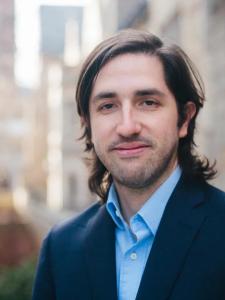Announcing the 2025-26 Lloyd and Susanne Rudolph Field Research Grant Fellows
CISSR is pleased to announce the 2025-26 Lloyd & Susanne Rudolph Field Research Fellows. These fifteen students and their projects continue the legacy of field work research pioneered by Lloyd and Susanne Rudolph, exemplifying the variety of geographic, disciplinary, and methodological strengths from across the Social Sciences Division.
Their projects examine a wide range of topics, including educational inequality in China; informal labor markets and economic reform; kinship and language development; historical and contemporary state-building; climate adaptation and environmental politics; and urban planning, migration, and religious nationalism, among others.
These awards cover expenses associated with original fieldwork, archival research, and more, deepening understanding and improving research. CISSR is proud to support the future of social scientific research at the University of Chicago and beyond.
We invite you to read more about the field research fellows and their projects:
Quanyi (Ryan) Dai (Sociology)
“How Much Do Disparities in Children’s Family, School, and Peer Environments Explain Gaps in Educational Outcomes?”
Prior research has conceptualized the rural-urban divide as a defining feature of educational inequality in contemporary China. Despite a wealth of literature on the growing divide, much less is known about the causal mechanisms that account for the substantial disparities in educational achievements between rural children and their urban counterparts. Grounded in ecological systems theory and the transition to adulthood framework, this project investigates how immediate social environments—families, schools, and peer groups—contribute to the rural-urban educational divide in China. Specifically, this project asks, how do disparities in family engagement, school characteristics, and peer-group features explain the rural-urban gaps in children’s educational outcomes, respectively? To examine this research question, Dai utilizes both archival and nationally representative survey data and employ advanced statistical models and causal inference techniques. This project will fill a critical void in the literature regarding how disparities in family, school, and peer group processes contribute to China’s rural-urban educational divide. Findings from this project will also inform policy interventions aimed at mitigating the divide and improving the well-being of rural children in China.
Yuchen Jin (Comparative Human Development & Psychology)
"Cultural Scripting of Kinship Term Acquisition: A Field Study of Mandarin-Speaking Children in Urban China"
Kinship system is a fundamental aspect of human societies, and its transmission across generations is crucial. However, children typically take an extended period to acquire kinship terms. While the cognitive constraints on this process are well established, emerging research highlights significant cross-cultural variation in the acquisition trajectory, emphasizing the critical role of sociocultural factors. This project investigates the acquisition of kinship terms among Mandarin-speaking children in China, a linguistically and culturally rich context that offers a unique opportunity to examine how early word learning is shaped by linguistic components, children’s daily experiences, and culturally specific cognitive tendencies. Jin expects to not only contribute to a more comprehensive model of early language learning in the field of developmental psychology, but also advance our understanding of the structured diversity of human kinship categorization, a longstanding question in anthropology and linguistics. In addition, this research will offer valuable insights into child development in contemporary China, where shifting family structures may influence the transmission and use of kinship terms.
Zachary Kuloszewski (Economics)
"Financial Constraints and Network Hiring in Urban Uganda"
Small- and medium-sized enterprises (SMEs) in low-income countries rely on informal labor sourced through various means, such as referrals and spot-markets. In Kampala, Uganda, Kuloszewski documents a practice where firms hire directly from firms with whom they compete on output markets. This practice, observed among 90% of informal SMEs in the carpentry and welding sectors, solves a labor search problem with limited information on skill and availability, subject to binding liquidity constraints. He hypothesizes that labor sharing systems have negative dynamic consequences for firms and workers. Firms pay repeated adjustment costs when hiring short-term and face sanctions for defecting from firm-networks if they do not provide reciprocal access to workers. Meanwhile, workers receive less investment from firms in the form of training. In equilibrium, workers bear more risk through short-term agreements, and firms miss out on more permanent hiring of high-quality workers. To test this hypothesis, Kuloszewski designs a wage-subsidy experiment which alleviates liquidity constraints on the margin of labor costs, and observes hiring, training, and firm performance. This project aims to document the incentives behind firm reliance on network hiring in informal labor markets and serve as a proof of concept for policy supporting stable employment and firm growth.
Ruiling Xue (History)
"Vernacular Culture and Social Formation of Value in the Late Imperial China Materi"
This project aims to write a history of market economy in early modern China (specifically materia medica commerce in 18th-19th centuries) but does so by introducing cosmologies and epistemologies that are radically different from those either viewing the market as a self-sustaining socio-economic entity of itself, or as a cohort of state, commercial, financial and other institutions. Rather, Xue depicts market economy as a constantly emergent intersubjective space. He privileges nonhuman subjective categories which those native to the times and places connected in early modern Chinese materia medica commerce found to be their interlocutors in such commerce, and articulated narratives (folklores, novels, plays), institutions (temples, guild-halls, businesses), and practices to make sense of commerce as traversing a world populated by deities, and species-beings (to use Marshall Sahlins’ term) as agential actors generating their own history. This is to suggest early modern market economy as much more than rationality and institutions. Xue takes commerce to be the flow of value through cosmological spaces, binding them, negotiating and altering the ontological settings of early modern Chinese society on all spatial scales and its relevant cosmological worlds. The result are materia medica gods who shared denominators and narratives – but many local names, many claims of efficacy, many histories drawing from many traditions; materia-medica plant-humans transgressing the same geographical boundaries that materia-medica merchants transgressed, moving between worlds both geographical and cosmological; and producers, merchants, consumers, intimately co-inhabiting a constantly mobile and expansive market economic space with powerful non-human others and scales of ontological worlds.
Wei Zhou (Sociology)
"Energy Transition in Colonial Manchuria, 1934 -1944"
Manchuria, a region today commonly known as Northeast China, came under the control of the Japanese Empire in 1931. In 1937, the colonial state of Manchukuo launched an “energy transition” policy to transition from dominantly thermal to hydroelectric power for its first Five- Year Plan, despite having control of the world’s largest open-pit coal mine. Why did the Japanese colonial state invest in transitioning to hydroelectricity instead of relying solely on its abundant coal resources?
Primary research on this project has found that, despite transitioning from coal-fired power plants to hydroelectric plants as the primary supply for electricity, the biggest increase in electricity consumption was first for mechanizing coal mines and liquefying coal into synthetic oil. Moreover, the infrastructure of dams was also central to the agricultural settler-colonialism project in rural Manchuria, by flooding and transforming dry farmland into wet rice paddies that were more familiar to newly arrived Japanese farmers. With this regional electrification plan, “Manchuria Electricity Company” grew into one of the most powerful colonial institutions, and eventually acted as a state proxy, with the right to expropriate land and coordinate the flow of energy on not only electricity but also coal.
Kasia Kalina (Anthropology)
"The Science and Technology of Maroon History in Colombia's Western Lowlands"
What forms of belonging emerge when communities are made to grapple with a past that is, by historicist standards of evidence, unknowable? This project takes up this question by undertaking a comparative ethnography of competing state and social movement theories of maroon (escaped slave) history. By definition maroons fled the gaze of the colonial archive and are thus considered exemplars of intentional unknowability vis-a-vis the historicist imagination. Scientists employed by the contemporary Colombian state nevertheless cite archives documenting maroon acts of disappearance as the rationale behind constructing the notion of a distinct maroon ethnic and legal identity that has “survived” into the present. On the other hand, urban social movement participants displaced by war from these same Black peasant lands have cited these same colonial archives to theorize the impossibility of state-administered legal restitution and the necessity of transnational solidarity in the midst of ongoing state repression. This project will investigate the debate between these two formations as an exemplary limit-case for examining the relation between evidentiary uncertainty on the one hand and ethical and political norms on the other. Kalina situates this question’s stakes across three scales of conceptual inquiry: theories of history, of state sovereignty, and of political consciousness.
Ryan Gibbons (Political Science)
“Urgency Across Geographies: Supporting Localized Investments in Irish Climate Adaptation”
How can broad political support be maintained for costly climate policies with exclusionary payoffs? Low-emission yet climate-prone states may be able to make only marginal investments to slow the progression of climate change, and instead must focus resources on “responsive” or “adaptive” policies. Yet, such policies are not only costly, but provide localized payoffs such that taxpayers in less-vulnerable regions bear some of the burden for protecting their more-vulnerable neighbors. This paradigm is reflected in Irish climate policy, whereby the nation – repeatedly experiencing worsening climate-related disasters – has retained a focus on reducing emissions despite its marginal impact on global carbon levels. This project will consist of interviews with local political and religious leaders throughout County Galway (a generally high-risk coastal region) and County Roscommon (an inland region unexpectedly ravaged by recent Storm Éowyn, targeting sentiments towards cross-regional investments in adaptive policies. Particular attention will be paid towards social institutions or practices which may encourage long-distance cooperation to enable such investments at scale. Fieldwork will also involve in-person collaboration with the University of Galway’s Climate Resilient Places program, as well as potentially the Kylemore Abbey’s Integral Ecology initiatives, to best capture the intricate perspectives of Irish citizens facing climate risks. Supporting both an in-course MA thesis and a later doctoral dissertation project, this fieldwork will provide critical insights into how to best align vulnerable communities both in and beyond Ireland with comprehensive and effective climate resiliency efforts.
Lilly Massoud-Judge (Political Science)
"Invest in Egypt: International Finance, Business Networks, and the State"
This project considers how the latest round of Egyptian market reforms have impacted material and affective investment in the Egyptian national economy, amid a backdrop of ongoing financialization and integration into regional and international circuits of capital. By analyzing concrete patterns of regional and international investment, as well as official and quotidian discourses around the economy currently circulating in Egypt, the research aims to show how the Egyptian national economy has become a privileged site of a broader reworking of citizen-state relations in the post-2013 period.
Alaina Wibberly (Anthropology)
"The Hills Have Eyes: Surveillance and Vigilance in the U.S./Mexico Borderlands"
This research traces the entangled knowledge-building projects of state border security programs (U.S. Border Patrol) and vigilante efforts (militias) along the U.S./Mexico border. Wibberly focuses on the corridor between the city of Nogales, Arizona and the town of Sásabe, Arizona, where the rugged terrain has produced an experimental zone for “virtual wall” surveillance technologies. As Border Patrol embraces a techno-surveillance regime, these technologies are increasingly automated, algorithmic, and Artificially Intelligent. This corridor, however, is also patrolled by vigilante actors who employ alternative knowledge-building strategies. The post-QAnon conspiratorial landscape fostered a resurgence of right-wing militias invested in the production of narratives about threatening borderlands figures, such as the terrorist, the drug smuggler, and the sex trafficker. Such vigilante media has gained popular traction since the first Trump administration. This project understands the techno-surveillance regime of state security programs and the conspiratorial campaigns of border militias as parallel and related trajectories. Through ethnographic and geospatial research with border security actors in the Nogales-Sásabe corridor, the project will follow the production and circulation of border security knowledge in a newly shifting political landscape that challenges distinctions between state and vigilante action, between fringe conspiracy and popular media, and between legitimate and illegitimate violence.
Moksha Sharma (Political Science)
"Imperial Bases of State-Building: How Britain was Shaped by its Empire"
How did colonialism affect state-building in the colonial metropole? Political scientists have long contended that international politics shape the domestic politics and institutions of former colonies in the Global South. However, they have failed to theorize about how domestic politics and institutions of the former colonial states were also shaped by colonial developments that occurred beyond their “national” borders. To fill this gap, this project studies how institutional reform occurred in 18th century Britain after the English East India Company acquired revenue collection rights in Bengal in 1764. This new role created an ideological crisis of empire, stimulated prolific public debate regarding questions of sovereignty and private ownership, and induced popular demands for institutional reform to prevent the EIC from usurping excessive power. Using natural language processing to analyse the pamphlets, news articles, and petitions that were circulating in the British press and public domain during the late 18th century, Sharma hopes to offer new insight into (1) how and why institutional reform occurred in colonial Britain at the moment that it did and (2) how narratives and public perceptions of empire changed over time. Ultimately, she highlights how state-building in Europe was not only a national process but also an imperial one.
Matteo Giordano (History)
"The Agrarian Roots of the Neoliberal Project German Interwar Agronomy, the Problem of a Free Peasant"
This project seeks to reassess the history of mid-XX century neoliberalism by unearthing its seemingly forgotten agrarian roots. By focusing on the work of German American agricultural economist Karl Brandt, Giordano will reconstruct the continuity of a transatlantic, policy-oriented argument on how to win battles against Communism in the global countryside that originated in interwar Germany and later extended to the US. As a result, a peculiar form of “agrarian neoliberalism” emerged, which had the ambition to orient US policy during the postwar stabilization of Third World.
To date, there does not exist an in-depth study of Karl Brandt and his work. By focusing on this influential German agricultural economist and reconstructing his intellectual trajectory and political activism, Giordano intends to work at the intersection of intellectual and political history and the history of international political economy. Besides reconstructing the network of experts that connected German agronomy to its American counterpart in a transnational discourse on agrarian governmentality, Giordano hopes to ultimately prove that mid-century Cold War neoliberalism was motivated not exclusively by the agenda of pushing back against the welfare state and instituting markets, but rather by the legacy of interwar conservative rural stabilization and Central European agrarian reformism.
Prachi Bhagwat (History)
"Making of the ‘Informal City’: Economies of Land Labour and Aspiration in colonial and postcolonial Bombay"
A history of capitalism, in the context of Indian urban studies, has largely amounted to a social history of the working classes that coalesced in classical sites of industrial capitalism––spatially concentrated single-commodity factory-based industries. The gothic structures of Bombay’s cotton textile mills embody that city’s experiment with industrial modernity. These concentrated urban spaces offered, in the 1980s and 90s, fertile ground to ask questions that by then had exercised Marxist historians for a few decades: whether and how workers mobilised against capital, and belatedly, how local social and cultural factors informed solidarity and resistance.
But in the background of this seemingly distilled drama of industrialisation, and contributing to its eventual unravelling, Bombay through the 20th century was a city beset by speculative economies in land. In contrast to the gentlemanly capitalist mise-en-scene of industrial production, these other sites and modes of accumulation have contributed to a mythology of Bombay as a city awash in “hidden money”, “spectral housing,” as a city governed by “the ideology of the big hit.” This project, part of a larger project on the historical genealogies of urban equality in colonial and postcolonial Bombay, moves beyond generalized descriptions of urban pathos to trace the historical emergence of speculative land “markets,” and the bearing this had on housing shortage and its experience by the city’s poor.
Daniel Quintanilla Castro (History)
"Meanings of U.S.-Mexico Extradition in National History"
Criminal extradition between Mexico and the United States is commonly associated with the war on drugs and the failings of international law. Nonetheless, U.S.-Mexico extradition has a longer history. Since 1861, extradition has played a fundamental, albeit unacknowledged, role in the bilateral relationship. It was through the legal figure of extradition that order at the frontier was imposed; that Mexico’s position towards slavery was defined; that the figure of “fugitive criminals” was constructed; and through which the legal limits of the war on drugs have been tested. This research project aims to reconstruct the long history of criminal extradition following the three treaties that Mexico and the U.S. signed in 1861, 1899, and 1978. Moreover, the project seeks to unveil how, besides formal proceedings of international law, extradition created a new form of criminality: international kidnapping. The history of U.S.-Mexico extradition is not only a history of the war on drugs. It is also a history of slaves, Native Americans, cattle thieves, smugglers, and all those whose lives were caught between U.S. imperialism and the systematic abuse of Mexican authorities.
Maya Nandakumar (Political Science)
"Patriotism in the Indian Gurusphere: Embodied Nationalism in Ritual Practice"
This project explores the language of the contemporary Hindu “gurusphere,” a network of spiritual leaders and religious influencers who deliver didactic commentaries on sacred texts. How do these spiritual leaders deploy mythological and historical narratives to express sentiments of patriotism? What forms of sacred and national restoration do they advocate? How is national pride embodied and experienced as devotion within these religious contexts? Using interpretive and ethnographic methods, this research attempts to address these questions.
Kaya Çolakoğlu (History)
When the Turkish Republic was founded in 1923, Istanbul was an ailing city in deep economic and social crisis. The Great War, an occupation by Entente powers, a subsequent War of Independence, and the move of the capital to Ankara had robbed it of its former imperial splendor and left behind a modest city of 700,000. The new Republican government thought a revival impossible and undesirable; instead, Istanbul had to be re-made to suit the ethos and priorities of a modern nation-state. In service of this aim, Ankara hired French urban planner Henri Prost, renowned for his work on Paris and Moroccan cities under French protectorate. Prost’s plan was implemented throughout the 1930s and 1940s. It transformed Istanbul from a city of disconnected townships reachable only by sea to a compact urban conglomeration crisscrossed by large avenues and motorways and concentrated industrial zones. The Prost plan produced modern Istanbul as an object of planning and conception: it demarcated its (geographic and conceptual) limits and made it into a technically alterable entity. Though the plan has been evaluated in terms of its immediate impact on the city’s landscape, its own history has not been interrogated. This project aims to reconstruct the intellectual and disciplinary history of the Prost plan and contemporary European urban planning through research in French archives where the papers of the Prost team are held. It intends to interrogate the global historical processes and intellectual movements in which the Prost plan and Istanbul’s transformation were nestled.
 THE UNIVERSITY OF CHICAGO
THE UNIVERSITY OF CHICAGO




